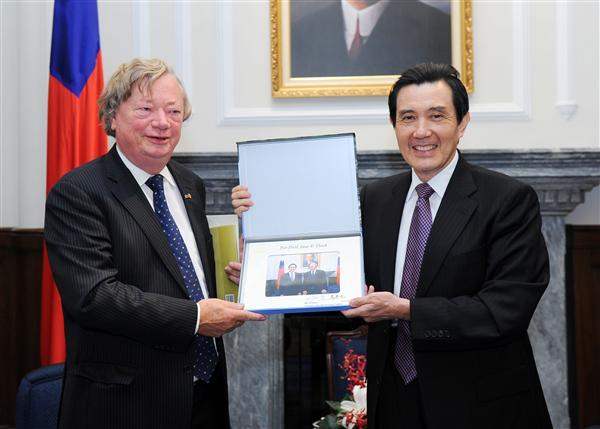News & activities
 News releases
News releases
President Ma Ying-jeou met on the morning of September 5 with Prof. Jaap E. Doek, the former chairperson of the United Nations Committee on the Rights of the Child. During the meeting, the president stated that even though the ROC previously lost its representation in the United Nations (UN), it can enact enforcement laws to incorporate the content of the UN Convention on the Rights of the Child into domestic law, thereby safeguarding the interests of children and youth.
In remarks, the president stated that the UN in 1989 adopted the Convention on the Rights of the Child, which set forth a comprehensive framework to protect the interests of children. He explained that although the ROC lost its seat at the UN and has been unable to become a party to the convention, the government has nonetheless made every effort to protect children. President Ma noted that the government in 1993 amended the Children Welfare Act, adding a special section directed at preventing child abuse. Furthermore, in 2011 the government amended and promulgated the The Protection of Children and Youths Welfare and Rights Act to add further detail to the body of laws and regulations aimed at ensuring the rights of children and youth. Moreover, last year during the nation's centenary, the government specially held a national conference on children and youth affairs to listen to the voices of children and youth, he said. President Ma pointed out that as long as there are still cases of child abuse here, the government will remain vigilant and work to ensure that children are protected.
President Ma also explained to Prof. Doek that the government has come up with a workaround to ensure that the content of UN covenants is implemented here. Citing the examples of the International Covenant on Civil and Political Rights, the International Covenant on Economic, Social and Cultural Rights, and the Convention on the Elimination of All Forms of Discrimination against Women, he said that after he signed the instruments of ratification of these covenants in his capacity as president, related enforcement laws were then promulgated to make the content of these covenants binding domestically. Even though the ROC is unable to deposit the instruments of ratification with the UN, the same effect has been achieved. President Ma stated that the Convention on the Rights of the Child in the future might be similarly incorporated into domestic law.
The president stressed that regardless whether specific covenants become domestic law, what is most important is that the government fully implements their content and makes them binding. This, he said, will ensure that children and youth are protected.
President Ma also mentioned that Prof. Doek is visiting Taiwan at the invitation of ECPAT Taiwan to participate in the ECPAT Taiwan International Conference on Combating Commercial Sexual Exploitation of Children – New Strategy and New Prospects. Prof. Doek has been invited to share his thoughts on the latest Optional Protocols to the Convention on the Rights of the Child, and enforcement of the Convention. It is hoped, the president said, that this conference will help to further enhance the protection of children and enable all children and youth in Taiwan and throughout the world to be able to enjoy the protection, education, and development they deserve.
The delegation of 10 individuals included Prof. Doek, ECPAT New Zealand National Director Alan Bell, ECPAT Canada Social Media Department Director Deborah Zanke, ECPAT Taiwan Honorary Chairperson Kao Li Li-chen (高李麗珍), and Chairman Kuo Ching-en (郭敬恩). The group visited the Presidential Office in the morning to meet with President Ma. Also attending the meeting were Legislator Alicia Wang (王育敏), National Security Council Deputy Secretary-General Philip Y. M. Yang (楊永明), and Deputy Minister of the Interior Tseng Chung-ming (曾中明).



